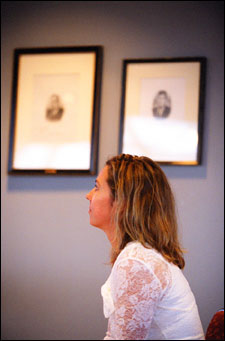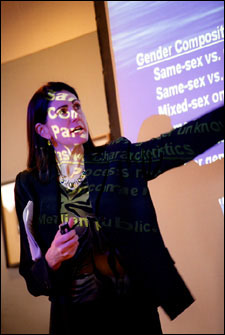Confronting stereotypes at negotiation table
By Jenny Attiyeh

Special to the Harvard News Office
Here’s the problem. You’ve just been offered the job of your dreams, but congratulations are not yet in order. Up next is the salary negotiation, and if you happen to be a woman, you are – statistically speaking – in trouble. You will end up with a lot less than your male counterpart. You’ll also miss out on that corner office and other juicy perks.
Why so? For starters, women don’t even think to ask. Even today, in the 21st century, women tend to shy away from negotiation, and take what’s handed to them. “Women don’t think negotiation is their domain,” explained Iris Bohnet, an associate professor of public policy, and the faculty chair of the Women and Public Policy Program at the Kennedy School. “From research on behavior at the negotiating table, we do know that in simple negotiations – like a salary or a car negotiation – women do worse than men.”
Armed with a background in economics and psychology, Bohnet decided to tackle this issue head-on by organizing a daylong research seminar devoted to the subject. Sponsored by the Provost Fund, and co-hosted by the Program on Negotiation at Harvard Law School and the Women and Public Policy Program, the seminar attracted a group of leading psychologists, organizational behavior experts, and experimental economists, who gathered to discuss their research at the Kennedy School on Oct. 22.

“No economic skill has as much riding on it as does negotiation,” said Leigh Thompson, a professor of dispute resolution at Northwestern University’s Kellogg School of Management, in addressing the seminar. So what does it take to win? According to Thompson’s research, it is not always the assertive, hard-driving, take-no-prisoners approach that we typically associate with masculinity. At times, stereotypically female skills can work just as well – if not better.
It all depends on the context. Laura Kray, an assistant professor at the Haas School of Business at the University of California, Berkeley, who co-authored this research with Thompson, argued that the traits traditionally seen as feminine can, in certain situations, serve women remarkably well.
“What we do is we modify the stereotype. If we prepare people, if we prime them to think of stereotypically feminine traits as valuable by telling them you need good listening skills and verbal communicativeness and empathy, that translates into the bottom line,” Kray explained. “Women go in and they say, ‘I have those things,’ and actually outperform their male counterparts. It gives women the confidence to set higher goals for themselves going into the negotiation.”
In a lab setting, Kray and Thompson have found that women can improve their negotiation skills dramatically – if they’re set up to do so. But for these findings to translate into the larger world is something else altogether. And that is a world where – according to Thompson, Kray, and other researchers – negative gender stereotypes remain firmly, if subtly, entrenched.
“Despite the things that have changed in society in the last 40 years, there are still enormous differences,” said Max Bazerman, the Jesse Isidor Straus Professor of Business Administration at Harvard Business School and the vice chair of research at the Program on Negotiation, who, alongside Iris Bohnet, served as the co-chair of the seminar. “What we heard today was the forefront of research on the social environments that in fact create big differences.”
A paper on how men and women compete in high-stakes games, presented by Felix Oberholzer-Gee, an associate professor at Harvard Business School, shows that both sexes, in playing the television game show “Friend or Foe,” learn to form stereotypical notions of each other – and learn to conform to these stereotypes. “It’s almost as if these stereotypes are self-confirming,” he said. “They get stronger over time.”
While all this might sound discouraging, Oberholzer-Gee sees in this research clear prescriptions for change. “The better we understand where these [gender] differences come from, the more we can do about these differences,” he argued. “In a sense, it’s very optimistic. You get the sense that the work is progressing in important ways.”
Bohnet’s paper on status and distrust, which she co-wrote with Kessely Hong, a Ph.D. candidate at Harvard, is one such example. “We believe that women have quite a different approach to conflicts,” said Bohnet. “My research on trust, for example, suggests that women are less averse to the fact that someone betrays them. Women do not like to lose money, and are very concerned about material resources, but just the fact that someone betrayed them doesn’t hurt them very much.”
In contrast, Bohnet and Hong found that men have the exactly opposite response. “We find that groups belonging to what we normally associate with having high status care less about losing the money, but they really care about the betrayal. The fact that someone let them down is really terrible,” explained Bohnet.
“So now we’re basically turning this around and saying, well, being dominant is normally thought of as being an advantage in our society, but here we have an example that it can actually be an advantage to not feel that need to always be dominating, to always be right.”




